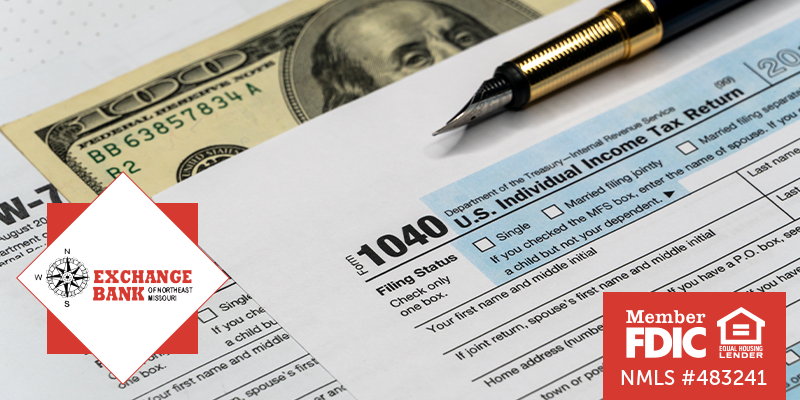Exchange Bank of Northeast Missouri
Updated 10:33 PM CST, Fri January 14, 2022
Published Under: Financial Education General Personal Finances

It’s tax season! The IRS sets the start of tax season as Monday, January 24, 2022, and the deadline as April 18, 2022. Tax planning will help you gather everything you need to promptly and properly file your taxes for 2022. If you’re already pulling at your hair from stress—don't worry! Get a jump on preparing for taxes this year by following the steps we’ve outlined below.
1. Decide How You Will Be Filing
Will you be doing the filing yourself or will you be hiring a professional? Will you be choosing to do so by hand or electronically? We recommend electronically for ease of use and greater security! If you choose to file taxes on your own, you will want to use tax software and file taxes online. Some popular options for tax software include:
- TurboTax
- H&R Block
- Tax Slayer
- TaxAct
If you have an adjusted gross income of $72,000 or less, you may qualify for free online tax preparation software from several tax preparation companies via the IRS Free File program. If you don’t feel comfortable doing this on your own, hiring a tax preparer to do this work may be in your best interest.
2. Gather All the Necessary Documents
When it comes to filing taxes, organization is key. Ensuring that you have all the documents you need will make the process smoother and quicker—whether you’re hiring a tax preparer or doing the filing yourself. You will need to gather proof of income, expenses that may be deemed tax-deductible and evidence of taxes you already paid throughout 2021. Here is a list of items you will need:
- Social Security Numbers – Make sure you have social security numbers ready for yourself, your spouse and any dependents.
- Income – Gather all documents that confirm the money you received during the previous year
- W-2 Forms: This shows how much you earned last year and how much you’ve already paid in taxes. Your employer will issue these by January 31, so keep an eye on your physical and electronic mail.
- 1099 Forms: This is for a record of money you earned from an entity or person outside of your employer. There are several different types of these forms, depending on the payment you received (Form 1099-MISC is for contract work, for example).
- Deductions – Gather any deductions that you may claim on your taxes, make sure this is documented as this will protect you if you are ever audited. It can also lower your tax bill! Popular tax deductions include:
- Educational expenses
- Retirement account contribution
- Unreimbursed medical bills
- Property taxes and mortgage interest
- Charitable donations
- State and local taxes you paid
3. Prepare to Settle Up with the IRS
If you owe any money to the IRS, there are several ways you can provide those payments to them, including: electronic payments, wire transfers, debit and credit card payments, checks and cash. If you aren’t able to settle everything you owe at once, the IRS does offer a payment plan. This payment plan is an agreement you make directly with the agency to pay your federal tax bill over a certain amount of time.
4. Prepare to Receive a Refund
If you’ll be receiving a tax refund, make sure you have everything in place, so the refund is deposited into your bank account as quickly and smoothly as possible.
- Avoid Filing by Paper – The first thing you can do to ensure the process is quicker is to avoid filing your tax return on paper. It takes the IRS longer to process paper returns than electronic ones. These are typically processed in about three weeks versus the six to eight it takes when you mail in your documents.
- Set Up Direct Deposit – If you have your refund sent by direct deposit, this will cut down on the waiting times you will experience if they send you a paper check through the mail.
- Track Your Refund – If you’re eager to check on the status of your refund, you can track it easily on the IRS website.
If you have followed all of these steps and gathered all the necessary documents to file your tax refund, the process should be an efficient and accurate one. If you have more questions about filing taxes, contacting an expert may be the way to go. If you have any questions about your finances, don’t hesitate to reach out to us. We’re here to help!
Exchange Bank of Northeast Missouri
Member FDIC
Equal Housing Lender
Comments